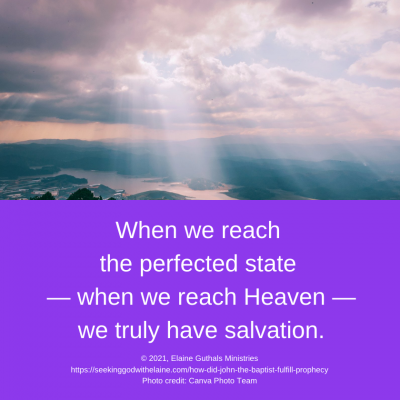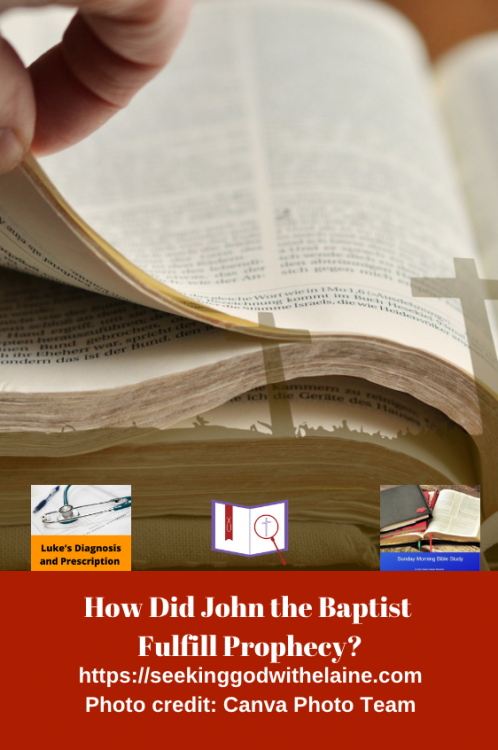John the Baptist has a very important job to perform. This daily devotion looks at how he fulfilled prophecy to complete that job.
Nuggets
- John the Baptist fulfilled prophecy by being the forerunner of the Messiah.
- John the Baptist fulfilled the prophecy of imitating the prophet Elijah.
- John the Baptist’s purpose was to announce the coming of Jesus.
Devotions in the John the Baptist series

John the Baptist’s purpose in life was not to be an interesting character. He had a very specific mission to which God called him.
John was to prepare the way for the Messiah.
In carrying out this purpose, John the Baptist fulfilled prophecy.
Let's Put It into Context
Here is a running list of what we’ve discussed previously.
The Familiar Fulfillment of Prophecy
“He went into all the vicinity of the Jordan, proclaiming a baptism of repentance for the forgiveness of sins, as it is written in the book of the words of the prophet Isaiah: A voice of one crying out in the wilderness: Prepare the way for the Lord; make his paths straight! Every valley will be filled, and every mountain and hill will be made low; the crooked will become straight, the rough ways smooth, and everyone will see the salvation of God” (Lk. 3: 3-6 CSB)
John the Baptist fulfilled prophecy by being the forerunner of the Messiah.
The way it reads, Scriptures kind of imply that John just showed up to work one day in the wilderness. That isn’t the case.
John’s ministry was prophesied in the Old Testament. In Isaiah 40: 3-5, it says
“A voice of one crying out: Prepare the way of the Lord in the wilderness; make a straight highway for our God in the desert. Every valley will be lifted up, and every mountain and hill will be leveled; the uneven ground will become smooth and the rough places, a plain. And the glory of the Lord will appear, and all humanity together will see it, for the mouth of the Lord has spoken” (Isa. 40: 3-5 CSB).
But isn’t that how God works?
God hears our prayers, but it doesn’t seem like He is answering. Then suddenly, we do get our answers. No, they may not be the exact answer we’re looking for, but they are God’s best answer.
I always thought it was fitting that John’s church building was the wilderness. The wilderness, a lot of times, is portrayed as something wild and untamed — dangerous.
Sin is that way. It produces chaos and is rampant if unchecked. It is dangerous as it leads to judgment and, ultimately, eternal torment.
To read a devotion in the Hell Does Have Fury series, click on the appropriate button below.
The Not-So-Familiar Fulfillment of Prophecy
John the Baptist fulfilled the prophecy of imitating the prophet Elijah.
Robertson said there is another prophecy that John fulfilled that we generally don’t discuss. “Look, I am going to send you the prophet Elijah before the great and terrible day of the Lord comes” (Mal. 4: 5 CSB).
I think this is one of those prophecies that has multiple applications. In a recent devotion, we talked about day of the Lord meaning when we will be called home.
Obviously, this heaven and earth didn’t ended in John’s day. But if John patterned his lifestyle after Elijah’s, I could see how he was considered to be another Elijah.
Robertson argued that John fulfilled this prophecy because if was “… an announcement of principles …” He contended that “… the announcement of every principle connected with a fact is a prediction of all future events that shall occur under similar circumstances.”
Resource
The Prophesied Message
John’s purpose was to announce the coming of Jesus.
We are used to calling someone on the phone or sending a text or email. In those days, important travelers had to send another person to make the announcement. Sometimes, they had to build the roads to get where they were going or clear the paths that were already there.
That is why John was there. What did John have to tell them?
- The Messiah was coming.
- They needed the Messiah to save them from their sins.
- They did that by repentance.
- They needed to listen, believe, and obey.
Resource
But what about verse 4? “Every valley will be lifted up, and every mountain and hill will be leveled; the uneven ground will become smooth and the rough places, a plain” (Isa. 40: 4 CSB). There are still hills and valleys in the world.
Macdonald implied that we shouldn’t take this literally. He suggested this means inattention, apathy, and despondency are some things with which must be dealt. Pride and presumptions must be eliminated as must prejudice, jealousy, censoriousness, and covetousness.
Macdonald didn’t want much, did he?
I think I need to be Dictionary Chick on two terms. Censoriousness means being critical of others. Covetousness is a greed for wealth and possessions.
To read a related devotion, click on the appropriate button below.
Macdonald didn’t stop there, though. Our not keeping the Sabbath day holy needs fixed. Our drunkenness and immorality needs fixed.
Resource
The Christian Standard Bible translates the last part of the verse as evening the rough ground. The King James Version takes a different slant. “… the crooked shall be made straight, and the rough places plain” (Isa. 40: 4 KJV).
Well, that connects with the gates. “Because strait is the gate, and narrow is the way, which leadeth unto life, and few there be that find it” (Mt. 7: 14 KJV).
If the gate is narrow — even though we don’t have to take a hilly, curved path to it — we need someone preparing the way.
Because, face it. We have a lot of crooked opinions. We think our ways of living and schools of thought are right.
We can miss the gate if we aren’t careful. We can refuse to see the Messiah if we don’t take the focus off of ourselves.
Glossary
Verse 5 is interesting. “And the glory of the Lord will appear, and all humanity together will see it, for the mouth of the Lord has spoken” (Isa. 40: 3-5 CSB). I see it as a John’s time prophecy and a day of the Lord prophecy.
Our salvation is coming. Salvation is deliverance from evil and the consequences of sins to replace them with good and eternal life.
When we ABCD, we gain salvation because we are changed from being spiritually dead to being spiritually alive. Spiritual death is the separation from God that occurred as a consequence of Adam and Eve’s original sin. The spiritually alive are those who have ABCDed, so they are no longer separated from God.
But we have to work out our salvation. We do this on the Sanctification Road. Sanctification is the transformation of mind, body, and soul, which begins with regeneration, gradually changes our nature through the promptings of the Holy Spirit, and ends with perfected state of spiritual wholeness or completeness. Regeneration is the change in us that God brings about when we go from being spiritually dead to spiritually alive.
When we reach the perfected state — when we reach Heaven — we truly have salvation.

Making the Connections
That is what John’s message was all about. The Messiah was coming to save us from our sins.
I love what Beecher said. He wrote, “We are to be saved, not by what we are worth ourselves; not by that which we have attained. Looking at ourselves in some sense as a piece of art, a picture, a statue, or an exquisite piece of machinery, we are not worth saving. In and of ourselves, there is nothing worth preservation. And all the work that we have ever done on our own character and nature does not amount to any considerable value. If we are saved, it will not be because of that which we have succeeded in doing; it will be because of that which has been done upon us and in us by another and higher artist-hand.”
Resource

How Do We Apply This?
Prophecy is a divine revelation to mankind through the Holy Spirit of a future event. That means we find out something is going to happen years and years and years before it does.
Scriptures are filled with prophecy, only one being that concerning John the Baptist. God does tell us a lot beforehand.
Since it comes true, we need to believe it. Then we have to act like we believe it.
John the Baptist said that Jesus was coming to “… [take] away the sin of the world!” (Jn. 1: 29 ESV).
Scriptures say that Jesus is coming back. He is coming back to judge us.
- “And if I go and prepare a place for you, I will come again and will take you to myself, that where I am you may be also” (Jn. 14: 3 ESV).
- “And while they were gazing into heaven as he went, behold, two men stood by them in white robes, and said, ‘Men of Galilee, why do you stand looking into heaven? This Jesus, who was taken up from you into heaven, will come in the same way as you saw him go into heaven’” (Ac. 1: 10-11 ESV).
- “Then I saw heaven opened, and behold, a white horse! The one sitting on it is called Faithful and True, and in righteousness he judges and makes war” (Rev. 19: 11 ESV).
We have to be ready.
Father God. You are a mysterious God. You do not tell us everything. You do tell us what we need to know. We need Jesus as our Savior and Redeemer. We need You as our Sovereign Lord. Convict us until we believe. Sanctify us until we have Your character. Bring us home to You. Amen.
What do you think?
Leave me a comment below (about this or anything else) or head over to my Facebook group for some interactive discussion.
If you don’t understand something and would like further clarification, please contact me.
If you have not signed up for the email daily or weekly providing the link to the devotions and the newsletter, do so below.
If God has used this devotion to speak with you, consider sharing it on social media.